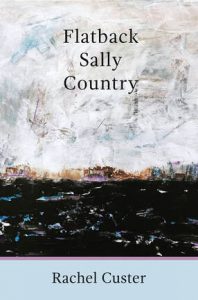Rachel Custer: Review by David Salner

Rachel Custer, Flatback Sally Country (Terrapin Books)
Anger and Mercy in the Poetry of Rachel Custer
Rachel Custer’s Flatback Sally Country is a work of originality and insight. She has unearthed a language buried under small town life, and brought something new to literature:
There is another town beneath this town,
where secret drinkers sneak to buy their pints
and secret lovers sneak to make their love
while sleepers sleep. I wake again to you.
There is another want beneath this want.
Look, she tells us, at “things half-buried in the dirt of this yard: a hard / candy, a used bandaid, the black half-marble of a doll’s / eye.” There’s nothing postmodern or reality-denying here. Pain is real. “Here’s a girl, hefted on to this barbed hook / of a place. Here’s a girl impaled on a day.”
The poems in this book give voice to those who live “alone / behind the turned back of the world.” Flatback Sally, who drifts in and out of these pages, struts before us, “a fake fur coat hanging on her frame / like she was wrapped in roadkill.” Crime is involved, done to, done by. With a fury reminiscent of William Blake’s lyrics damning emergent capitalism, she spins out aphoristic arguments: “Who wouldn’t / lift a nipple to his lips? What a woman knows of feeding / is what a lamb knows of a knife.” And brilliant formulas based on a hard life in which empathy has a special place:
If a man comes home
like a storm making landfall against a shore,
his children thin trees bent before his wind,
a mother must be the sun.
Women bear the brunt. Custer has been witness to abuse, so there is primitive force and anger in her description of “a man / with swarming wasps for eyes.” But she is not a primitive poet. To find out more about her approach, look up her interview in Open: Journal of Arts and Letters, where she describes her varied influences and her thoughtful and studied approach to writing. One sentence particularly struck me: “My critique, then, of mainstream contemporary artistic practice is a critique of an ideology that would argue against the existence and/or necessity of objective truth, much less the importance of seeking it.”
Flatback Sally Country is not a collection of poems that hedge their bets or celebrate inconclusiveness. They are clear and hard, without excuses, and based on her knowledge of the lives of those who toil around her. “Farmer” is one of my favorites, about a farmer who asks, “What will it help/to plant again and again that field where / my boy died, and to harvest regret from / the black soil of the past.” The farmer refuses to indulge in self-pity or to tolerate the pity of those who have no idea what his life is like:
Save your sorry. Your sorry won’t get me
my crops in before the frost. Your sorry
won’t fill the propane tank. Confess me up
a big old sack of free feed, while you’re at it.
This poem offers good advice to a world where apologies are coin of the realm for everyone from bad-boy athletes to politicians. Fake morality and slickly worded pity contrast with Custer’s genuine compassion, as in her poem, “Knock Knock”:
When you’re a joke, everything
sounds like a laugh. Even your pleading. Even
your own desperate knocking at your neighbor’s door.
Poetry can be charming, even magical, and that’s a good thing. But is that enough? This is a book for those who’d like more from poetry, a fresh understanding in language ablaze with anger and mercy.
David Salner is the author of Summer Words: New and Selected Poems (Broadstone Books, 2023). His debut novel, A Place to Hide, won first place for historical fiction from Next Generation Indie Book Awards. He’s worked as an iron ore miner, a steelworker, a librarian, a baseball usher, and in many other trades. His writing also appears in Threepenny Review, Ploughshares, North American Review, Iowa Review, and previously in Valparaiso Poetry Review.